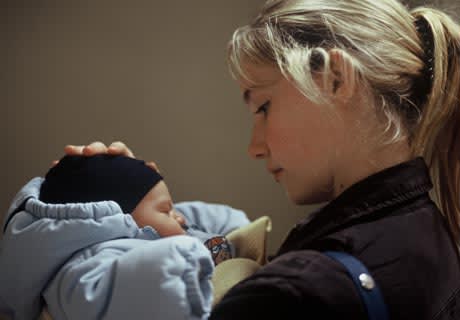L'Enfant, winner of the Palme D'Or at the 2005 Cannes Film Festival, is grisly realism at its most grating. Twenty-year-old Bruno (Jérémie Renier), a panhandler and petty thief, has just fathered a child with his 18-year-old girlfriend Sonia (Déborah François). Not only has he neglected to visit her in the hospital, he's also sublet their squalid flat while she was giving birth; when Sonia finally locates him, he's begging for change and planning his next scam. As it dawns on Bruno that his child could be a rich source of income, he commits an unspeakable act of icy manipulation that forces him to change his life.
Bruno and Sonia are annoying, self-indulgent children who constantly rib each other, breaking into fits of rambunctious teasing and spending what little money they have on gifts for themselves instead of food for their baby. Their habit of rubbing foreheads is by far the saddest indication of their co-dependent relationship.
So, if unsympathetic characters render most films inaccessible, why would this one win the Palme D'Or? Because stories of redemption are usually colour-by-number affairs with little ingenuity, and L'Enfant cleanses the jaded critical palette, steering clear of manipulative bunk and heading straight for the awful truth with a deft and random efficiency. Instead of having external events constitute the three-act structure of the film, Jean-Pierre and Luc Dardenne glue it to Bruno's character arc. As he gets closer to the reality of his life, his journey highlights L'Enfant's cynical premise: people only change if they have to.
L'Enfant is not an escapist treat. It's a difficult, rewarding film that examines what extreme circumstances do to human beings, and what they'll do to survive. (Mongrel Media)
Bruno and Sonia are annoying, self-indulgent children who constantly rib each other, breaking into fits of rambunctious teasing and spending what little money they have on gifts for themselves instead of food for their baby. Their habit of rubbing foreheads is by far the saddest indication of their co-dependent relationship.
So, if unsympathetic characters render most films inaccessible, why would this one win the Palme D'Or? Because stories of redemption are usually colour-by-number affairs with little ingenuity, and L'Enfant cleanses the jaded critical palette, steering clear of manipulative bunk and heading straight for the awful truth with a deft and random efficiency. Instead of having external events constitute the three-act structure of the film, Jean-Pierre and Luc Dardenne glue it to Bruno's character arc. As he gets closer to the reality of his life, his journey highlights L'Enfant's cynical premise: people only change if they have to.
L'Enfant is not an escapist treat. It's a difficult, rewarding film that examines what extreme circumstances do to human beings, and what they'll do to survive. (Mongrel Media)
